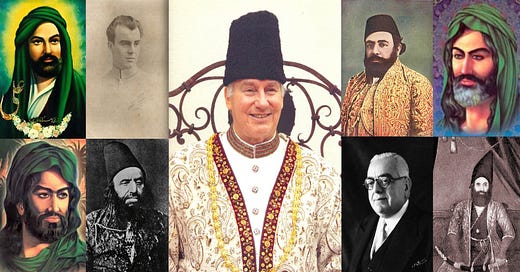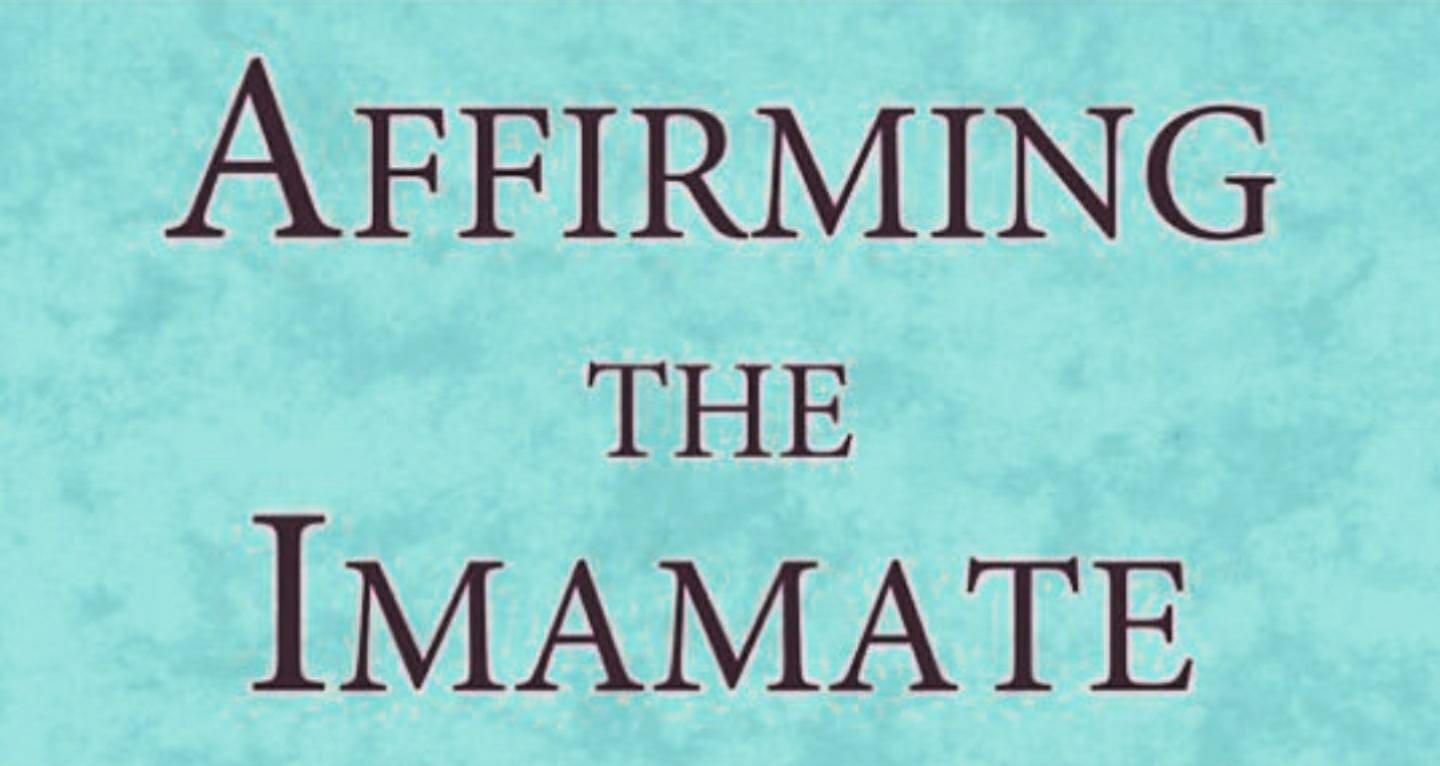Imamat as the Eternal Sunnah of Allah (Part 1)
The Ismaili View of the Continuous Presence of God's Khalifah in the Earth
In his treatise on leadership in Islam, Kitab Ithbat al-Imama (Book on Affirming the Imamate), Ahmad b. Ibrahim al-Naysaburi, an important Fatimid Ismaili da‘i, scholar and writer of the early 5th/11th century, puts forth a unique argument on the absolute necessity and natural supreme authority of the Imamat based on a theory of ‘Degrees of Excellence’. For al-Naysaburi, the natural world, including systems and structures of human society, are filled with examples indicating how everything in creation is arranged hierarchically along varying “degrees of excellence” (tafadul), all of which serve as evidence for a single Imam, or Leader, at the summit.
While this article will make significant use of material from Ithbat al-Imama, a section of which served as the initial inspiration for this exploration of the Imamat as the eternal sunnah (way) of Allah, our purpose here is not to review this treatise as a whole nor even its main thesis. Therefore, we will not examine further al-Naysaburi’s articulation of Imamat vis-à-vis his theory of ‘Degrees of Excellence’. For that, and to understand the intellectual context in which al-Naysaburi was operating as one “among the many da‘is who attempted to grapple with this subject” of the authority of the Imam, one may consult the excellent (pun intended) reading guide on the Degrees of Excellence prepared by the Institute of Ismaili Studies.
In this two part article, we will focus on the fundamental Ismaili principle of the necessity of a present (hazir) and living (mawjud) Imam who, as God’s Vicegerent (Khalifatu’llah) in the earth, embodies or makes manifest through his very existence God’s eternal presence and permanent way of providing humanity with Divine guidance. In furthering his argument that “there has never been a period of time that has been deprived of a true Imam to whom obedience is obligatory” (Reading Guide: Degrees of Excellence, 7), al-Naysaburi quotes verse 2:30 of the Qur’an to make the point that God’s Khalifah — the Imam of the Time — must always exist in the earth, even if all people were, so to speak, ‘angelic’.
Al-Baqara (The Cow)
When your Lord said to the angels, “Indeed, I am appointing (ja‘il) a Vicegerent (Khalifah) in the earth. They said: “Are You going to create one that will corrupt and shed blood on it while we glorify Your praises and regard You holy?” He said: “[Surely], I know what you know not”.
وَإِذْ قَا orلَ رَبُّكَ لِلْمَلَـٰٓئِكَةِ إِنِّى جَاعِلٌۭ فِى ٱلْأَرْضِ خَلِيفَةًۭ ۖ قَالُوٓا۟ أَتَجْعَلُ فِيهَا مَن يُفْسِدُ فِيهَا وَيَسْفِكُ ٱلدِّمَآءَ وَنَحْنُ نُسَبِّحُ بِحَمْدِكَ وَنُقَدِّسُ لَكَ ۖ قَالَ إِنِّىٓ أَعْلَمُ مَا لَا تَعْلَمُونَ
« 2:30 »
Commenting on the above verse, al-Naysaburi writes:
We say that if it were acceptable that there be creatures on earth without there being an Imam or Caliph, then that should have been acceptable during the time of Adam, peace be upon him, when there were [only] angels. At that time God, the Exalted, said: “Indeed, I am appointing a Vicegerent on earth.” They said: “Are You going to create one that will corrupt and shed blood on it while we glorify Your praises and regard You holy?” He said: “[Surely], I know what you know not”.
God, may He be glorified, clarified in that passage that there would never be a time when the earth is deprived of an Imam, even if all the people were impeccable and saintly, so that they would realize how indispensable the Imam is when they are ignorant—and most of them are corrupt.Da‘i Ahmad b. Ibrahim al-Naysaburi, Kitab Ithbat al-Imama, tr. Arzina R. Lalani, Degrees of Excellence: A Fatimid Treatise on Leadership in Islam, 76-7.
Here, al-Naysaburi argues for the necessity of a divinely appointed Imam or Caliph (Khalifah) by making reference to the belief held by the masses that during the time of Adam, only angels were present. If ever there was a time when God’s Vicegerent was not required, surely it would have been when only angels existed on the earth. For our Fatimid da‘i, verse 2:30 was revealed so that people may realize that there will always be a Divinely appointed Imam, regardless of how pure (like angels) or how corrupt (like ignoramuses) the creatures (i.e., people) on the earth are.
Al-Naysaburi goes on to point out that in the story of Adam there is an indication that the position of the Imam or Caliph cannot be decided by the choice or consultation of the people, because were that possible, then the the angels — who “were immune from jealousy and rebellion” — would have been given the privilege to choose or consult with one another regarding who the Caliph or Imam should be. As stated in Ithbat al-Imama,
God, the Exalted, also made plain in that passage [i.e., in 2:30] that if it was acceptable for the Imam to be chosen (ikhtiyar), then the angels certainly would have been given the choice. He would not have contradicted them because they were immune from inclinations, false desires and cravings for the world and for domination. Since that was not acceptable for them, it is not acceptable for those below them [i.e., ordinary human believers].
Da‘i Ahmad b. Ibrahim al-Naysaburi, Degrees of Excellence, 77.
The story of Adam, for Ismailis, particularly where it is revealed that angels inquired and expressed some doubt about Adam’s designation as the divinely chosen Vicegerent of God, was mentioned in the Qur’an so that people during and after the Prophet Muhammad(s)’s time “would learn a lesson from it” and not argue (which, nevertheless, most did) about whomever God and His Messenger chose to be the Imam. A deeper layer of this lesson is that it proves that it is simply beyond the capacity of ordinary believers, well-intentioned or otherwise, to judge or correctly perceive who is (and who isn’t) “suitable for the Imamate.” Thus, referring to God’s response to the angels’ underestimation of Adam in Q. 2:30 (and likely alluding also to Q. 2:31-34 where God reveals to the angels — through Adam’s ta‘lim or instruction — that which He knows and what they knew not), al-Naysaburi writes:
In it, there is also an indication that it is not for people to say whether such and such person is suitable for the Imamate or not, and that they prefer one to the other. God, the Exalted, informed those who did not like Adam about the error of their speech, reproached them and rebuked them, showing them the falsehood of their words.
Da‘i Ahmad b. Ibrahim al-Naysaburi, Degrees of Excellence, 77.
Let alone ordinary believers or the commonality of Muslims, in direct connection with the divine designation of Adam’s Khilafah, the Qur’an demonstrates how even the angels are unable, on their own, to correctly assess Adam’s nobility. Therefore, how could they or anyone else choose who should be the Caliph or Imam when they are unable to recognize — through their own opinion (ra’y), deduction (qiyas) or consensus (ijma‘) — the reality of the sublime position of Allah’s Khalifah? This is precisely why every one of God’s Vicegerents (Khulafah’, eg. Anbiya, A’immah) must be divinely chosen or selected (istafa, 3:33) to be the means (wasila), intermediary (wasita), locus of manifestation (mazhar), or ‘Hand of Allah’ (see 48:10, 8:17 and their ta’wilat) through whom God acts and interacts with creation, especially in the form of teaching, guiding and giving esoteric knowledge (‘ilm-i batin) which would otherwise remain hidden and unknown — even to the angels (see 2:31-33 and the ta’wil of the ‘science of names’). Emphasizing the divine nature of the work of God’s Khalifah, al-Naysaburi writes:








